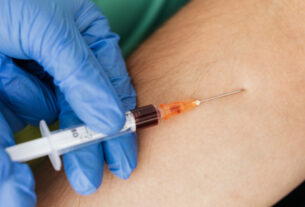Peanut butter is a popular and delicious food. It is rich in nutrients such as protein, dietary fiber, healthy unsaturated fats, vitamins such as vitamin E and B, and minerals such as magnesium, potassium, and zinc. Peanut butter contains about 600 calories per 100 grams, or about 90 calories per tablespoon. Additionally, it has some other advantages that you might not know about.
Here are eight things you should know about peanut butter:
1. Good source of protein: Peanut butter contains plant protein that is an excellent source of protein for your nutritional needs.
2. Rich in nutrients: Peanut butter contains essential substances such as potassium, magnesium, vitamin E.
3. Doesn’t raise your blood sugar: If you consume peanut butter without sugar, the blood sugar level will not rise after eating peanut butter.
4. Increases good cholesterol: The distribution of the fat in the peanut butter is in favor of the unsaturated fat that helps produce good cholesterol (HDL) in the body, thus contributing to the prevention of cardiovascular diseases.
5. Filling and satisfying: Peanut butter has fats and fibers that can help with the feeling of satiety for several hours and essential nutrients such as proteins, vitamin B of its types, iron, calcium and more.
6. Encourages muscle recovery after physical activity: Due to the high protein content, peanut butter is rich in amino acids that contribute to muscle recovery after physical activity.
7. It is good to expose babies to peanuts: Already at the age of five months, babies can be exposed in the form of Bamba or ground peanuts, in a small amount, twice a week. This can prevent the development of a peanut allergy later in life.
Peanuts are one of the most common allergens among children, a peanut allergy is a hypersensitivity reaction mediated through IgE (antibodies that the body produces) to peanut proteins, which can lead to severe allergic reactions that can be fatal, including anaphylaxis. Early exposure can prevent the development of an allergy.
8. You should pay attention to ingredients: Sugar, salt, and vegetable oils are added to industrial peanut butter products, which lowers the quality of the food
Like everything good and delicious in life, you need to know the doses and limits. Natural peanut butter is indeed rich in nutritional values, but also in calories. If we incorporate a tablespoon of peanut butter every day, we can get all the benefits and the delicious taste. It is recommended and advisable to buy natural peanut butter that contains only peanuts, without the addition of other fat, sugars, and various salts.
You should check the nutritional composition and nutrition label before buying the product in the store.
For those interested in making it at home, it is advisable to roast the peanuts before the crushing stage, at a temperature of about 150 Celsius to reduce the amount of toxins in the spread. If you want to incorporate peanut butter into your daily menu, you can combine it in various Asian sauces and salads. It can replace the egg in baked goods, make a frozen date dessert stuffed with peanut butter, and you can simply spread it on bread.
Smadar Primor is a clinical dietitian at Maccabi Health Services, North District




